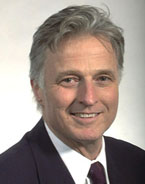Flint Week to Raise Funds, Draw Attention to the Water Crisis
UAlbany's Center for the Elimination of Minority Health Disparities Examines Issues Related to Water Pollution, PCB Exposure
 |
|
The film Blue Gold: World Water Wars will be shown on Monday, March 7, at 6:30 p.m. in Husted Hall.
|
ALBANY, N.Y. (March 1, 2016) – Is it safe to drink the water? This question continues to permeate communities both nationally and locally in recent weeks.
Lead has been found in the tap water in Flint, Mich., where the city switched to the local Flint River as a temporary water source a few years ago to save money. Capital District communities in Hoosick Falls and Petersburgh, N.Y. are asking the same question where residents were recently told not to drink the water.
The problems of access to safe water and income inequality are sometimes intertwined. In Flint, an estimated 41 percent of 100,000 residents live at or below the poverty line.
In recognition of this issue, the Association for Black Social Workers and the School of Criminal Justice Graduate Student Association have joined together to present Flint Week, a fundraiser that runs through March 7 to raise money for the victims of the Flint water crisis. Student concern about the water crisis and its impact on the people of Flint, will culminate with a film screening of Blue Gold: World Water Wars, on Monday, March 7 at 6:30 p.m. in Husted Hall, Room 106 A, 135 Western Ave., on the Downtown Campus.
Film director and producer Sam Bozzo is allowing the film to be screened free-of-charge in support of the event, and donations will be accepted at the door.
In addition to the film, the Association of Black Social Workers will be tabling in the Campus Center this week, selling raffle tickets for several gift cards and a grand prize valued at $250. The group will continue tabling and host a bake sale on the Downtown Campus on Thursday, March 3 for the same cause.
UAlbany’s Experts in Environmental Pollutants and Minority Health Disparities
 |
|
CEMHD Director
Lawrence Schell |
UAlbany Center for the Elimination of Minority Health Disparities (CEMHD) Director Lawrence Schell has been invited to speak at a Town Hall-style forum to discuss the Flint Water Crisis near the end of March at SUNY New Paltz. Schell lead's CEMHD's efforts to partner with community groups to identify their health concerns and the sources of disparities, and then plan, implement and test strategies to alleviate them.
For instance, the Center has been working with the Akwesasne community in Northern New York to determine whether the reproductive health of women of the St. Regis Mohawk Tribe on the St. Lawrence River has been adversely affected by exposure to chemical pollutants, primarily PCBs. The project holds many similarities to the situations in Flint and Hoosick Falls, particularly how health disparities impact smaller communities compared to major cities.
CEMHD's focus on minorities and under-served populations in the smaller cities and towns of Upstate New York is premised upon the notion that health disparities found in these areas differ from those in the larger cities, and that the appropriate solutions will also differ. Since most of the research on minority health disparities, and the programs that have resulted from it, has focused on populations in large cities, relatively little is known about the distinct causes of poorer health among minorities in smaller cities. Therefore, another reason for CEMHD's geographical emphasis is to fill in a gap in the research and to initiate and test the appropriate solutions.
Schell is among several UAlbany faculty experts in areas such as public health and water quality are available to discuss the ramifications of these issues. Others include:
- David O. Carpenter is a public health physician who serves as director of the Institute for Health and the Environment, a Collaborating Center of the World Health Organization, as well as a professor of environmental health sciences at UAlbany's School of Public Health. He examines the health effects of environmental contaminants, including metals and organic compounds. Carpenter previously served as Director of the Wadsworth Center of the New York State Department of Health, and as Dean of the University at Albany School of Public Health. Carpenter, who received his medical degree from Harvard Medical School, has more than 370 peer-reviewed publications, 6 books and 50 reviews and book chapters to his credit.
- Julia Hastings is an assistant professor of Social Welfare and an expert on poverty issues among ethnic minority populations, mental health and welfare participation dynamics and African American health and mental health disparities. Hasting’s research interests cover health and mental health disparities among ethnic minority populations, African American mental health, welfare participation dynamics, and ethnic minority women’s health issues. Her research projects focus on the relationships between race, mental health outcomes, health conditions, risk and protective factors, and poverty. She has published on culturally competent research methods within African American communities, welfare participation, depression, and body weight. Her research grant portfolio includes funding from the National Institute of Minority Health and Health Disparities, NIMH, the Ford Foundation, and the Robert Wood Johnson Foundation.
![]() For more news, subscribe to UAlbany's RSS headline feeds
For more news, subscribe to UAlbany's RSS headline feeds
A comprehensive public research university, the University at Albany-SUNY offers more than 120 undergraduate majors and minors and 125 master's, doctoral and graduate certificate programs. UAlbany is a leader among all New York State colleges and universities in such diverse fields as atmospheric and environmental sciences, business, education, public health,health sciences, criminal justice, emergency preparedness, engineering and applied sciences, informatics, public administration, social welfare and sociology, taught by an extensive roster of faculty experts. It also offers expanded academic and research opportunities for students through an affiliation with Albany Law School. With a curriculum enhanced by 600 study-abroad opportunities, UAlbany launches great careers.


